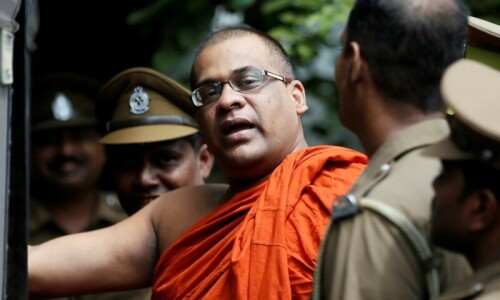By Annie Ali Khan
IN 1999, Hasan Mujtaba, an exiled writer, was wandering through the streets of New York, when he came upon a procession of Hare Krishna devotees. Mujtaba had been in New York for a few months since fleeing Pakistan. Soon after arriving, he began to walk the streets, looking for a way to connect with the new place. The hot summer day in New York and the sights and sounds of the procession struck a familiar chord, and Mujtaba paused by the side of the road to gaze: the riotous shades of marigolds and crimson, the chanting of bhajans and the beat of the dhol were similar to the music that echoed through the lanes of Sehwan Sharif, where devotees moved in a trance-like state amid thousands who flock from miles away every year to pay their respects to the patron saint Lal Shahbaz Qalandar.
Amidst the crowds walking past, Mujtaba spotted a familiar face — an old man resembling Allen Ginsberg, the American beat poet who had travelled across South Asia in the 1960s. Mujtaba found in the vision of the poet his own reflection transposed: the Westerner roaming the streets of India writing poetry was similar to how he, a foreigner from the subcontinent, now roamed the streets of New York.
That moment of revelation is captured in the opening poem of his book Koel Shehr Ki Katha, a collection of poetry recently published by Sanjh publications. The very first time I met Mujtaba, I was among a small group of friends gathered in an apartment to listen to him. All of us present in the room belonged in one way or the other to the subcontinent and the opening poem, ‘Allen Ginsberg ke naam’ in its juxtaposition of New York with Sindh was arresting in its simplicity and ability to traverse two otherwise seemingly disparate worlds. Mujtaba held aloft the book in his hands as he read out from it, a slim lavender title with an illustration of a koel on the cover.
Mujtaba has spent over a decade chronicling stories from Sindh. Born in the Ghotki district, on the northern-most edge of the province, Mujtaba’s poems are a timeless lyrical narrative of the life and times of a writer who grew up by the banks of the Sindhu. In New York, at the launch of his book, Mujtaba read to a small group of friends and peers. The June day was perfectly in sync with the verses of the ode to Ginsberg:
Avenue Fifth par
Rama Krishna ke jaloosoun mein
Woh Allen Ginsburg ka hamshakal boorha
Woh gervi rangoun, jaltarang aur dhamaaloun
Goroun kaaloun aur kai saat rangoun mein
Ropehli June mein
Chup chap tanha aur yagana iss tarhaan
Jaise woh iss saare falsafay ka ho bas aik aakhri nuqta
The realisation hit me that up until the moment he had read the poem, I had assumed him to be a migrant such as myself. His 15 years to my five, a comparison in time. During our conversation, prior to his reading, I learnt that Mujtaba had been away from Pakistan for more than a decade. But the fact of his exile never came up. Whereas my memories were softened by the promise of return, Mujtaba’s memories lay severed by a rift — on one side the world he left behind and on the other the point where his exile began, a new country.
He recalled anecdotes, furnishing them with precise dates and times; the clarity of someone who constantly looked beyond the chasm created by severance to a world mapped by memories, perfectly sealed in its contours. In the poem ‘Zafaryab Ahmed ke naam’, dedicated to his friend who wandered alongside him in those first few months, Mujtaba searched for the nature of his exile in New York. Exile, he wrote, was not a warm and comfortable winter jacket and neither did it have the tenderness of the touch of a lover.
There is a vivid sense of a man finding himself exceedingly lonely. While standing in line at the welfare office of the social services department, a homeless man on the pavement swears at him. The anger of the man reminds Mujtaba of his own foreignness. The moments may be familiar to any migrant moving to a new place. The search for home beginning the moment the realisation of loss settles in. A yellowed clipping of a newspaper blowing about on the street, in the company of parched maple leaves, reminds Mujtaba of home; perhaps of the days when he worked as a journalist. In the cold indifferent atmosphere, he returns to the people of the pavements and finds welcome in the bitter smile of a homeless man — more real to him than the shimmering towers of the Manhattan skyline:
Jilla watni koi narm o garam fancy jacket nahi
Jiss ko pehen kar tum shumali zamistaan ki hawaaoun mein barfani rutoun mein chaand girhan ka nazaara dhoondne niklo
Narm o garam fancy jacket ke jiss ko pehen kar kisi mehboob ya mehbooba ki meethi lams ka ehsaas ho
Jilla watni koi drama bhi nahin jo dinoun, raatoun, haftoun, maheenoun saal ha saal se broadway par younhi chalta rahe
Exile, I realise after meeting Mujtaba, is immediate and at the same time it is a condition that can span a lifetime. A migrant, too, harbours a not-so-secret desire to one day return home, even as the nature of what home means to the person continually transforms — the boundary between memory and reality blurring as the years progress. No matter how many times one goes back, one can never capture that feeling of being home. The way it was, the memory of home, grows more elusive.
The migrant realises that everything has changed, and so has the self. The home one left behind increasingly closes in on itself. At some point, it is as if one has ceased to exist, a world mapped in memory, the migrant becomes an exile. Mujtaba’s gaze, melancholic, takes a sharp turn as his verses force one to stare straight down the abyss. In one verse, he addresses his watan; his home, his country, his residence he left behind, writing that whenever he sings of the separation from his watan, he finds himself turning inwards:
Watan teri judai ka
Mein jab bhi geet gaata houn
Mein khud mein laut aata hoon
Magar goli ki boli mein
Woh mujh se baat karte hain
Woh deewaroun pe tehreerein nahin parhte
Ke garneloun ki wardi par gadhaa peshaab karta hai
The poems are a powerful testament to the real narrative of exile. They serve to remind those who saw the person leave that the person still exists and to those who welcome him, they must acknowledge the duality of the exile’s existence. In the mapping of a new world he has managed to build a pathway between New York and Karachi. The cause of Mujtaba’s exile is the punishment countless journalists face — death threats. In Pakistan, the narrative has been repeated countless times and continues today.
In the poem ‘Yusuf naam ka larka’, a boy named Yusuf dances like a serpent, to the beat of the music played by the snake charmer, musician and a member of the Jogi community of Sindh, Iqbal Jogi. Yusuf dances, covered in the blazing colours of Holi. It is a world where prayers are offered at mosques which are right next door to Hindu temples. Pigeons perched on the mosque minarets, where, Mujtaba writes, the sound of azan is still heard every day. Mujtaba’s poetic vision of Yusuf is beyond the confines of religious lines traced in the contours of holy structures: Yusuf is a believer and Yusuf is godless. In the poem, Mujtaba traces the arc of his own journey of self-discovery; starting from the place of his birth, Ghotki, to the urban enclaves where Mujtaba came to reside as a young man, the city of Karachi. In the dancing boy, Mujtaba has managed to capture all that is perhaps fading and forgotten:
Woh Yusuf naam ka larka jo aksar yaad aata hai
Woh naagin ki tarhaan bal khaata kahein Iqbal jogi ki madhur murli ki lehroun mein
Sufiyoun ke raqs mein salfi ke shoule mein
Sharaaboun ke nashe mein neelgoun jheeloun ke paani mein
Mohabbat ke qisse kahani mein
Mein iss ko bhool bhi jaaoun
Wo aqsar yaad aata hai
Mujtaba was dressed like a wanderer, even as he sat there reading to us in the living room. The poem ‘Koel shehr ki katha’ unveiled the world locked within the gaze of a wanderer. The koel on the cover of the book had a night-time scene of a cityscape drawn inside its body — the perfect metaphor:
Jiss shehr mein circus lagti thi
Jiss shehr mein theater lagte thhe
Jiss shehr mein jatti gaati thhi
Kya gaati thhi
Aur iss ke gaate gaate mein
Koel bhi ruk si jaati thhi
Aur phool ki daali
Baali par
Jhuk jaati thhi
Sab chhorein herein hoti thhein
Sab chhore ranjhe hote thhe
Raatein o nijhli hoti thein
Aur baqi mirze hote thhe
Kuch pait ki aag mein jalte thhe
Kuch ishq ki aag mein jalte thhe
Kuch aise waise jalte thhe
Who shehr hansaata hai mujhko


















































Dear visitor, the comments section is undergoing an overhaul and will return soon.